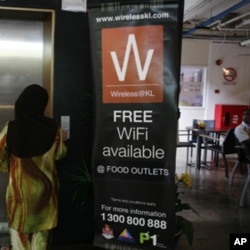In Kuala Lumpur, Malaysia, many still enjoy a simple breakfast of coffee and toast from modest and traditional-looking coffee shops for under RM2 (about 65 cents), while reading newspapers or chit-chatting with friends or family on a lazy morning.
Currently, those that want wireless Internet services along with their meals usually opt to go to more expensive cafes such as Starbucks or restaurants in shopping malls.
However, the pattern may change with a new ruling for almost all restaurants in the city to provide wireless Internet services.
In efforts to make Kuala Lumpur a city with full wireless Internet (WiFi) coverage, the city government recently required all food and beverage outlets to provide such services to customers by April this year.
The requirement is mandatory for all new food operators with premises bigger than 120 square meters in floor size, when they apply for an operating licence. Existing vendors must provide the service before they can renew their business licence.
Cafes, pubs, bars and club lounges are also required to provide WiFi services, the mayor of Kuala Lumpur, Tan Sri Fuad Ismail, was quoted as saying to a Malaysian newspaper recently.
“The WiFi service is in demand and food outlet operators who offer it will be giving their customers value-added services. The outlet operators are free to provide the WiFi services to their customers for free or for a reasonable fee,” he said.
Wong Hon Yau, a 29-year-old engineer living in Kuala Lumpur, says having wireless Internet services in all restaurants will add convenience to patrons. “Customers will not be confined to cafes that serve pricey drinks to get connected to the Internet,” he said.
While this requirement does not affect food and beverage outlets that already provide wireless Internet service, it could impact smaller establishments such as coffee shops serving local cuisine.
Restaurant and coffee shop vendors are caught off guard by the requirement, as they said it would mean extra costs to them.
“I am not aware of such ruling as the City Hall has not given me any notices on the ruling,” said M. Yusoff, an owner of a local coffee shop. He said he might have to raise the prices of the food and drinks on the menu.
A spokesperson of the Chinese Restaurateurs' Association of Kuala Lumpur and Selangor said its members are also not aware of the ruling and found it absurd that the City Hall should force businesses to provide such services.
“If customers want to spend time surfing the Internet while drinking their coffee, they should go to cafes such as Starbucks. Why make smallish restaurants provide such services too?” he said.
Restaurant operators are wary of the ruling mainly because they are worried that patrons would spend longer time sitting in the premises. “For most of these smallish eateries, we depend on a faster turnover of customers. If the customers refuse to leave because they want to take advantage of the wireless Internet services but at the same time not order more food or drinks, we, the vendors, may end up making losses in our businesses,” Yusoff said.
Many restaurants and cafes, especially those serving mid-priced food and drinks, offer wireless Internet services to attract patrons. Kuala Lumpur became the first “wired” city in the country when it began offering a municipal wireless network known as “WirelessKL” in 2008. Penang, a popular tourist island in the north of Peninsular Malaysia, started its own municipal wireless network a year later.
Nevertheless, Malaysia still lags behind many other Asian countries when it comes to broadband Internet penetration. Only about seven out of 100 Malaysian residents were broadband Internet users in 2010. The number was 25 out of 100 in Singapore, while Hong Kong and South Korea have 30 and 36 broadband users per 100 inhabitants, respectively.





